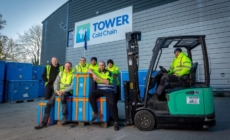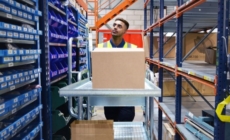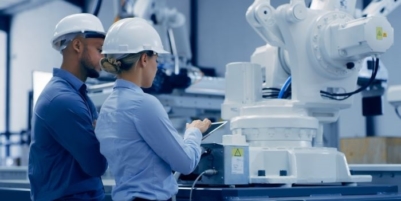-
Tower Launches Customer Sustainability Hub with Practical Tools for Lower-Impact Pharmaceutical Cold Chain - October 16, 2024
-
Six decision-making models for best practice WMS digital transformation - October 16, 2024
-
“Transforming Logistics: Precision and Purpose” – BIFA takes centre stage - October 15, 2024
-
JAMES JONES & SONS LTD EXPANDS ITS PALLETS & PACKAGING DIVISION THROUGH THE ACQUISITION OF HG TIMBER LTD - October 10, 2024
-
HUGO BECK EXPANDS MACHINE RANGE FOR E-COMMERCE, MAIL ORDER AND LOGISTICS - October 10, 2024
-
Winning Irish Exporter of the Year, Combilifts CEO Martin McVicar talks about the journey into the Global Market - October 8, 2024
-
JAMES JONES & SONS’ AUSTRALIAN SUBSIDIARY, HYNE GROUP, EXPANDS TO WESTERN AUSTRALIA - October 3, 2024
-
QUECLINK LAUNCHES SOLAR-POWERED ASSET TRACKER FOR TRAILERS AND CONTAINERS - October 3, 2024
-
Southgate Global Calls for Greater Health and Safety in the Warehouse Back Care Awareness Week - October 3, 2024
-
Nulogy to Expand Capabilities with Strategic Acquisition of Mingo Smart Factory - October 3, 2024
Sustainability, customer experience and productivity suffer due to lack of data capabilities, admit manufacturers
A third (32%) of manufacturers agree that data is one of their most valuable assets, comparable to their people, physical assets, and intellectual property, and 28% see data and data analytics as key drivers of their organisation’s product or service value chain. But, with nearly one in five (22%) confessing to having no strategy around data, and the industry struggling to overcome data silos, as data (31%) and analytic use cases (29%) remain local or within their respective applications, the industry sector responsible for one-fifth of the world’s carbon emissions is still struggling to harness data to become more sustainable, according to new research from Hewlett Packard Enterprise (HPE).
HPE’s Global Data Maturity Survey revealed that a quarter (25%) of manufacturers agree that their data shortcomings could negatively impact their energy efficiency and environmental sustainability. At the same time, just under a quarter recognise that customer experience and satisfaction (24%) and internal efficiency and productivity (23%) could also suffer as a result of inadequate data capabilities.
As manufacturing companies around the world face increasing pressure to reduce their carbon footprint in order to become more sustainable, data is proving to be a critical tool in helping them achieve these goals. However, the research also revealed that manufacturers encounter various barriers when it comes to implementing strategies to realise the full potential of their data. Senior management’s need for education in recognising data value creation as a strategic priority is the number one obstacle, cited by more than a quarter (26%) of manufacturers; while just under a quarter (24%) admitted that cultural barriers are holding them back when it comes to realising data value and implementing a data-centric strategy.
By embracing advanced analytics and monitoring tools, manufacturers can optimise their energy efficiency, reduce waste and emissions, and increase productivity. However, to achieve this, manufacturers will have to share and, if possible, centralise their data, be it in data warehouses, data lakes, or ideally data hubs that connects crucial data sources for both analytics and operational use cases. As they advance their analytics methods and tools, it will enable them to derive key insights that are relevant across the organisation as a whole and not only within selected business units, helping them to improve their overall sustainability, optimise productivity, and create a smooth customer experience.
“We know that the manufacturing sector is one of the primary contributors to the world’s carbon emissions, with the lack of data transparency across the organisation making it difficult to determine an organisation’s footprint, let alone address decarbonisation. However, rising energy costs and changing customer attitudes towards sustainability, together with inflationary pressures make it essential for manufacturers to implement an effective strategy to realise their data’s full potential, if they are to tackle these issues head on. Failing to do so will make sustainability targets such as the UK Government’s Net-Zero Strategy difficult, if not potentially impossible to meet. Data is key for manufacturers – they must embrace it for a successful and sustainable future, not just for their organisation or the manufacturing industry itself, but for the greater good of the planet as a whole.” says Marcus Bonner, UKIMEA Chief Technologist for Manufacturing, Hewlett Packard Enterprise.































